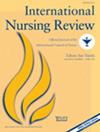Chinese Nurses’ Perspectives on Robotic Health Education: A Qualitative Study
Abstract
Aim
To explore the attitudes and perceptions of Chinese nurses toward robotic health education.
Background
Nurse shortages have driven the adoption of robotics in clinical health education. However, limited evidence exists on nurses’ attitudes and perceptions regarding robotic health education, highlighting the need for further exploration to understand their perspectives on this technology.
Methods
A qualitative interpretive descriptive study using inductive thematic analysis. A total of 28 clinical nurses from tertiary general hospitals in China were interviewed.
Findings
Nurses expressed both high expectations and concerns regarding the integration of robotic health education into clinical practice. Three significant themes emerged: (1) Affirming the Future of Robotic Health Education: Coexistence of Expectations and Doubts; (2) Expectations for Robotic Empowerment in Health Education: A Gap Between Technological Aspirations and Practical Realities; and (3) Expectation for Diverse Support in Robotic Health Education: Concerns about the Technology Integration Gap.
Conclusion
The results indicate that while nurses acknowledge the value of robotic health education, they are also concerned about the technological limitations that may compromise patient safety. Consequently, there is a strong desire for future robotic health education to be more user friendly, intelligent, humanized, and secure. Nurses are particularly eager for robotic health education, under optimal environmental support, to effectively reduce their workload rather than merely serve as a display of technology.
Implications for nursing and nursing policy
These insights reveal both the benefits and challenges of using robotic health education in clinical nursing. The findings guide the optimization of workflows for integrating robots into clinical nursing and inform future technological advancements. Further research is needed to understand the attitudes of a broader range of stakeholders.

 求助内容:
求助内容: 应助结果提醒方式:
应助结果提醒方式:


